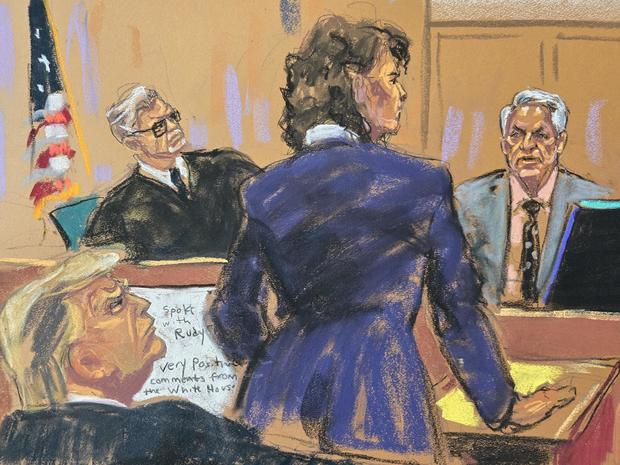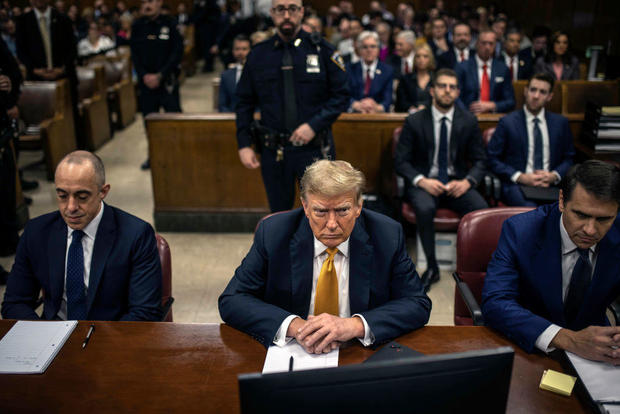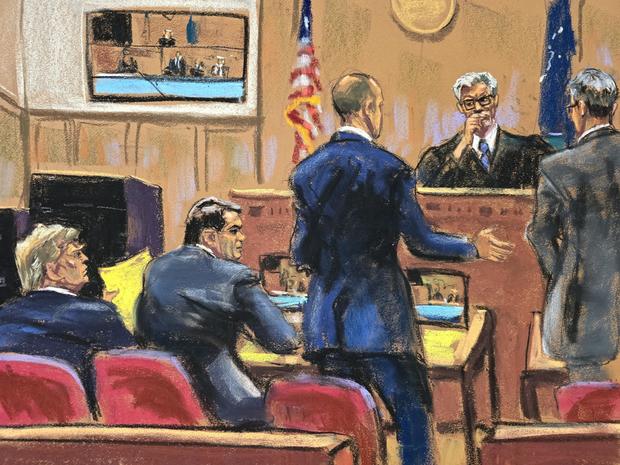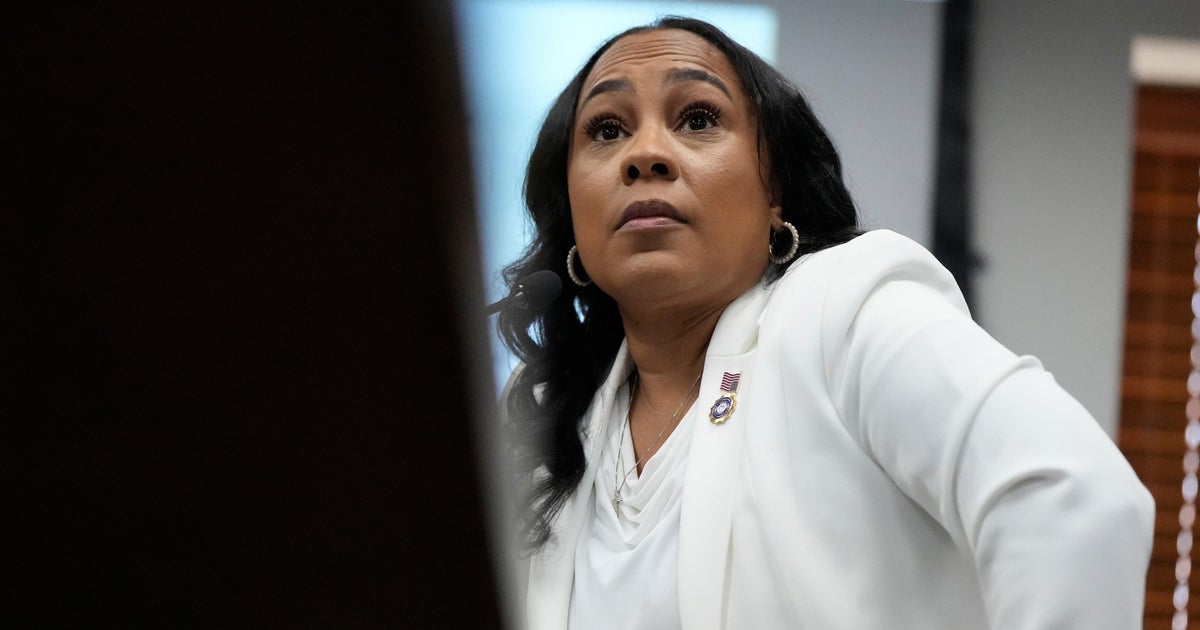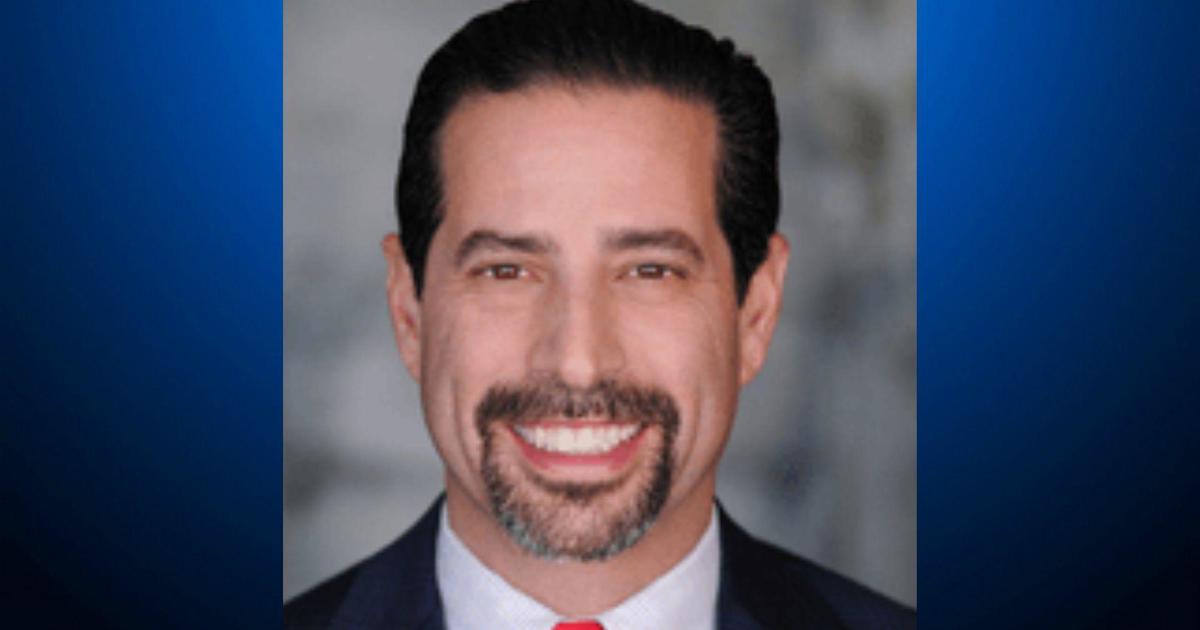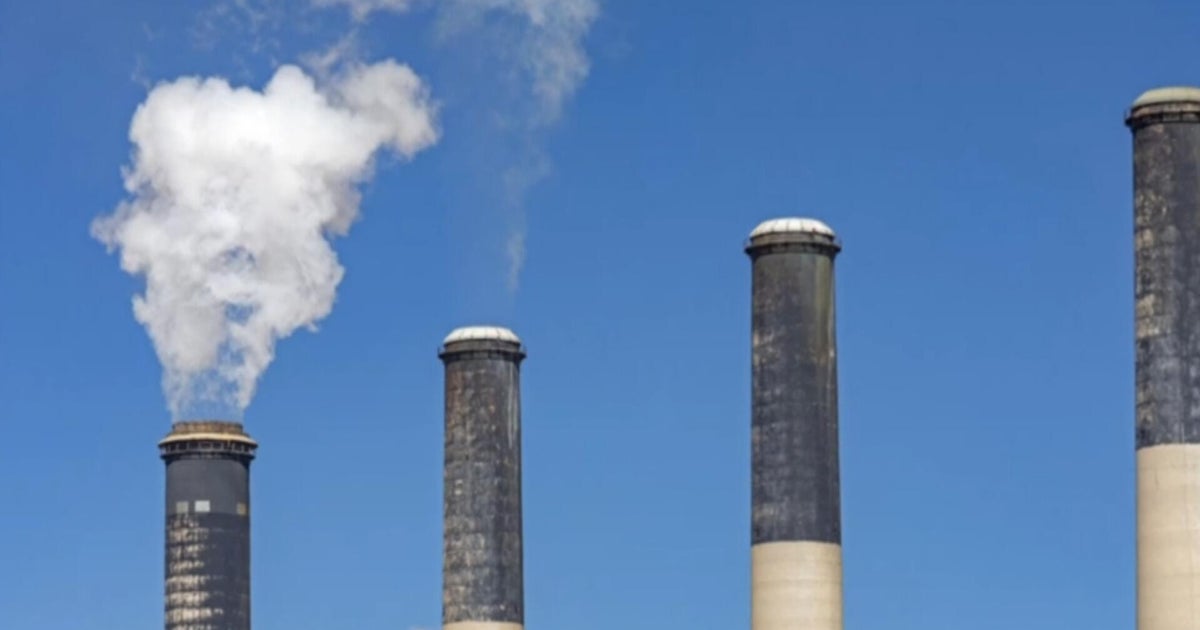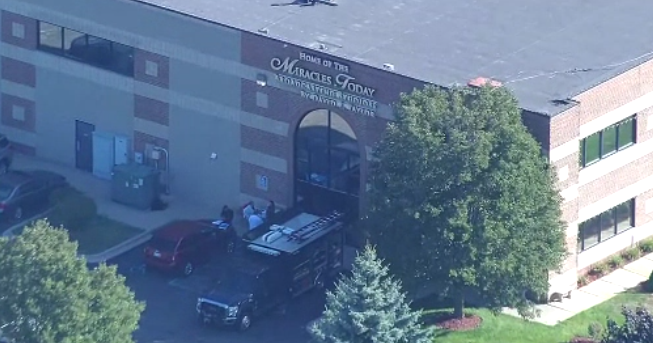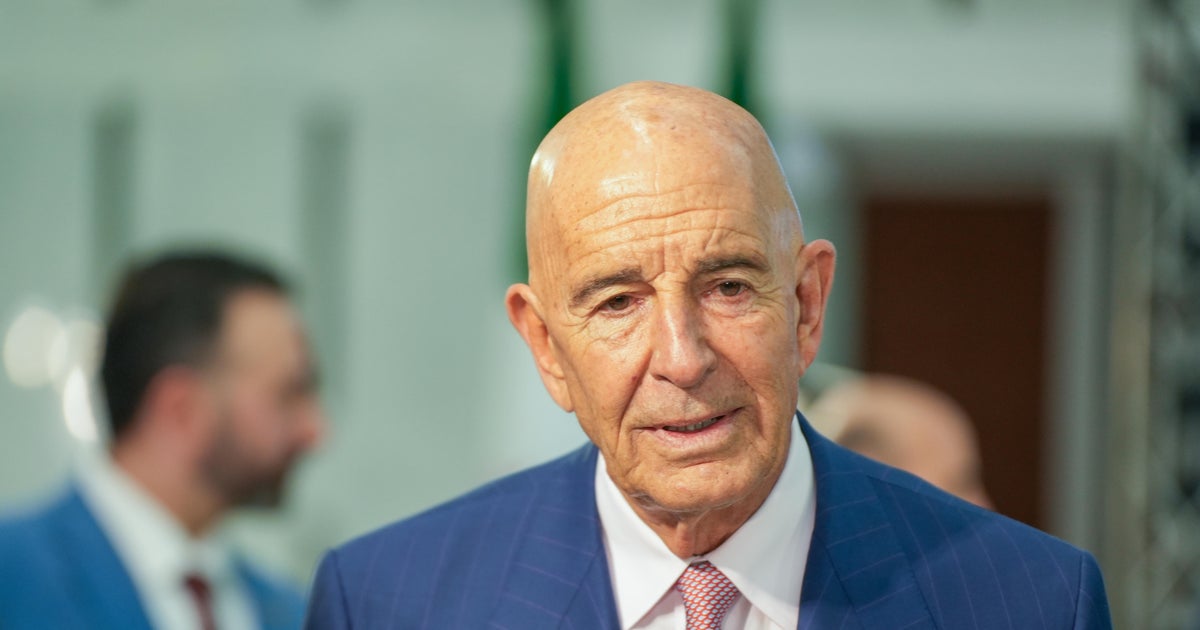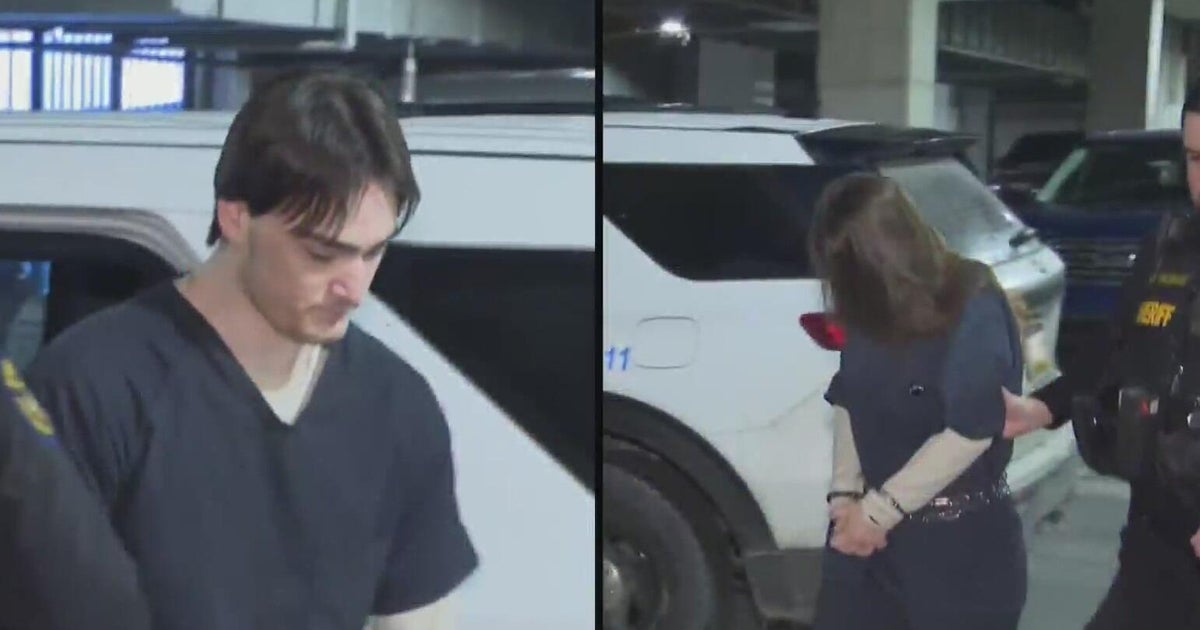Trump defense rests its case at "hush money" trial, teeing up closing arguments next week
Former President Donald Trump's defense rested its case at his "hush money" trial on Tuesday, opening the final chapter of proceedings before the jury begins deliberations next week.
The former president had hinted for weeks that he might take the stand, and has railed against the judge's gag order limiting what he can say outside the courtroom about the witnesses who testified against him.
Ultimately, however, Trump looked on from the defense table as his attorneys called just two witnesses: a legal analyst and an attorney named Robert Costello, who got a harsh dressing down from Justice Juan Merchan on Monday.
Costello's testimony was aimed at discrediting the prosecution's star witness, Michael Cohen.
Costello told jurors that Cohen told him in 2018 that Trump "knew nothing" about the $130,000 payment that Cohen made to the adult film star Stormy Daniels before the 2016 election. Cohen put up the money himself, and testified that Trump knew of a plan to cover up the payments reimbursing him. Trump has pleaded not guilty to 34 counts of falsification of business records stemming from the reimbursements.
For his part, Cohen said he never trusted Costello, and lied to him to protect himself.
After Trump's team rested its case, the judge heard arguments from both sides over the instructions he will give the jury before they begin deliberations. The court won't meet for a week, with closing arguments set to begin next Tuesday. The jury is expected to get the case the next day.
Here's how Tuesday unfolded in court:
Donald Trump Jr. attends trial for the first time
Eric Trump has long been the only member of Trump's family to attend the trial, sitting in the front row on several occasions.
Today, one of Trump's other adult sons showed up: Donald Trump Jr. took the seat often occupied by Eric.
In addition to Trump Jr., the seats often filled by an ever-changing assortment of Trump's allies include former acting Attorney General Matt Whitaker, former Florida Attorney General Pam Bondi, Sen. Eric Schmitt and Reps. Daniel Webster, Dan Meuser, Ronny Jackson, Troy Nehls, Dale Strong and Maria Salazar. The group also includes former aide Sebastian Gorka, actor and former Hell's Angels chapter president Chuck Zito, actor and radio host Joe Piscopo, and businessman Bill White.
Gorka walked in holding what appeared to be a steel briefcase. Contents unknown.
Costello returns to the stand
A day after being chastened by the judge, who asked if Costello was "staring me down," Costello has been called back to the stand.
Costello's antics Monday caused Merchan to take the extremely rare move of clearing the courtroom of all members of the public. He then threatened to strike Costello's entire testimony, according to a transcript of the exchange.
Costello is a rebuttal witness, called to counter specific gaps the defense claims were in Cohen's testimony. Merchan restricted what he could be asked about, leading to sustained prosecution objections as defense attorneys asked questions beyond Merchan's bounds Monday.
As Merchan sustained the objections, Costello rolled his eyes and, according to Merchan, broke decorum.
Both sides indicated they're close to finishing their questioning of the disruptive witness.
Costello goes over emails with Cohen from 2018
Under cross-examination by prosecutor Susan Hoffinger, Costello walked through a series of emails he sent to Cohen over a course of several months in 2018.
Many of them referenced Costello's conversations with Giuliani, Trump's newly named personal attorney, including one in which Costello says he can be a "back channel" to Giuliani. In another, he told Cohen he was "loved" and has "friends in high places."
"Friends in high places definitely refers to President Trump, yes?" Hoffinger asked.
"I think that's reasonable to conclude," Costello said, noting he didn't remember specifically.
Hoffinger then brought up an email Costello sent to Jeffrey Citron, his law partner, in May 2018: "Our issue is to get Cohen on the right page without giving him the appearance that we are following instructions from Giuliani or the President."
On the stand, Costello said they were trying to "get everyone on the same page, because Cohen had been complaining incessantly. Giuliani had been making statements to the press that Cohen did not approve of."
Costello called Cohen an "a**hole" who was "playing" Trump
During Costello's continued cross-examination, he was asked about his testimony yesterday in which he said he had Cohen's sole interest in mind throughout their communications.
Hoffinger sought to rebut that testimony by showing an email from Costello to his law partner in June 2018 that said: "Tune into CNN and see how they are playing this up. Cohen has to know this and he continues to slow play us and the President. I am in a golf tournament tomorrow early and again on Sunday. What would you say to this [a**hole]? He is playing with the most powerful man on the planet."
Cohen had previously outlined what he deemed a back channel of communication — from Costello to Guiliani and ultimately to Trump. Cohen testified that he was not honest with Costello because he worried that anything he told him would make its way back to Trump.
"You still have animosity for Michael Cohen, yes or no?" Hoffinger asked.
"I don't have animosity, I just don't think he's telling the truth," Costello replied.
Trump's defense rests, signaling start of trial's final chapter
After Costello finished his testimony, Trump's defense rested its case.
The defense was largely focused on cross-examining witnesses called by prosecutors during the last month, honing in on attacking Daniels' and Cohen's motivations and credibility.
After saying for months that he intended to testify in his own defense, Trump decided not to. He remained seated at the defense table Tuesday, as he has been throughout the trial.
Judge lays out the schedule for the final phase of the trial
After Costello was dismissed, Merchan laid out the schedule for how the rest of the trial will unfold.
The court is adjourned until 2:15 p.m. At that point, attorneys for both sides will deliberate over the instructions the judge will give the jury on the law and how to determine a verdict. The jury is not present for those arguments.
The instructions, known as a jury charge, are often lengthy, with the judge explaining complicated legal concepts and a weighty set of decisions in a way that any layperson might understand. His exact words are parsed carefully by both defense attorneys and prosecutors, who want to ensure that they don't lose the case on this last matter.
After the charge conference, the court will adjourn until next Tuesday, when the jury will return. Both sides will present their closing arguments, or summations. Merchan said he thinks summations will take the entire day.
The court will then meet on Wednesday, when the judge will give the jury its charge. Merchan said that process should take about an hour, after which the jury will begin deliberations.
Donald Trump Jr. says Trump had "absolutely no reason" to testify
After speaking outside the courthouse as the court took a break before the afternoon session, Donald Trump Jr. responded to a question about why his father didn't end up testifying in his own defense.
"How do you justify this insanity? Look at the clowns that they put on there. You don't subject yourself to that nonsense. You're going in a kangaroo court. There's nothing more, nothing less," he said. "There'd be absolutely no reason, no justification to do that whatsoever. Everyone sees it for the sham that it is."
Court reconvenes for charge conference
The court has reconvened, minus the jury, for the conference over the instructions, or charge, that Merchan will give the jury.
Trump attorney Emil Bove got things started for the defense.
Prosecutors and defense attorneys engage in scriptwriting
During a charge conference, lawyers for both sides and the judge debate the exact words the judge will use to instruct jurors on their assignment before they begin deliberating.
Sometimes the judge sides with prosecutors in a debate, as he did when Joshua Steinglass said defense attorneys removed the word "accomplice" from standard jury instruction language they proposed to the court.
Sometimes the judge sides with the defense, as he did when prosecutors wanted him to strike language proposed by the defense related to the "normal, legitimate" work of the press — a relevant issue because of the National Enquirer's role in "catching and killing" stories about Trump.
Sometimes, the judge just doesn't like saying a word. In this case: eleemosynary.
Pronouncing the word, which means charity or charitable, is "the most challenging issue facing all of us," Merchan said, prompting laughter.
Merchan said he's had to say the word 100 times over the years, but still can't get it right.
Everyone involved agreed on striking it from the script.
Trump mostly engaged in courtroom during hearing
Trump has been mostly engaged with this hearing, as it has evolved into arguing over minutiae like the definition of "intent" and "causation." He has been flipping through stacks of papers in front of him, pulling a page close from time to time, and occasionally whispering in Todd Blanche's ear.
Trump's entourage of lawmakers and allies is paying attention for the most part, besides Sebastian Gorka, who appears to be on his phone.
What the debate over jury instructions is about
The debate over the jury instructions is largely centered around how jurors should think about the prosecutors' theory of the case.
The crime Trump is accused of committing — falsifying business records — can be prosecuted as a misdemeanor, but the charge is often upgraded to a felony if the records are falsified with the "intent to defraud includes an intent to commit another crime or to aid or conceal the commission" of a crime, as the statute says. The Manhattan District Attorney's Office typically charges these types of cases as felonies.
Trump's defense is arguing that there is no underlying crime, and therefore Trump is not guilty. Prosecutors have alleged that the "catch and kill" scheme hatched by Trump, Cohen and David Pecker constituted an illegal conspiracy to violate campaign finance laws, thus satisfying the requirements for the felony charges.
Bove expressed concern that the jury could find Trump guilty based on a flawed finding related to the campaign finance issue, and wants the judge to set a high bar for the jury to determine that the falsification of business records was connected to a campaign finance violation.
Prosecutors, meanwhile, want Merchan to give the jury broader instructions for considering whether there was an underlying crime.
In one crucial determination, Merchan rejected a defense effort to have him say that prosecutors "must establish beyond a reasonable doubt two separate intents: the intent to defraud and the intent to aid in the commission of a crime."
Merchan said that language represented a "material change in the statute," explaining that the two intents are not defined as separate in the law.
Judge mostly sides with prosecution in debate over jury instruction language
Merchan sided with the defense a few times as the two sides argued over jury charge language, but for the most part found prosecutors' arguments more persuasive.
Prosecutors repeatedly said defense attorneys were proposing language that was contrary to that which is typically used in jury instructions. In each of those instances, the judge said he prefers to stay as close as possible to commonly accepted parlance.
In one instance, Merchan told Bove the defense could raise during closing arguments the idea of electronic evidence recovered from Cohen's phones being unreliable, but that he would not give an instruction to that effect.
In another instance, Merchan called Bove's continued arguments about the defense using "advice of counsel" in their arguments "disingenuous." When Bove tried to defend himself, Merchan said, "It's not going to happen," adding that the defense had tried to make that claim for "many, many months." Minutes earlier, Merchan tried to quell Bove's repeated arguments on this, telling him "please don't get up."
Merchan said he would read the relevant rules and hoped to give the final jury instructions to both sides by Thursday. With that, court was adjourned.
